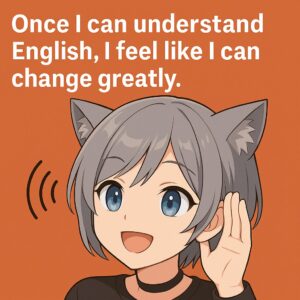NHKラジオ英語講座2025年版のまとめ
📝このブログには英語版があります(下にスクロールしてご覧ください)
📝This post has an English version below. Please scroll down!
NHKのラジオ英語講座は、英語学習を無理なく続けたい人にとってとても役立つ存在です。
私は「小学生の基礎英語」以外のすべての講座を実際に学習しています。
番組ごとに内容やスタイルは違いますが、私は毎日すべての講座を欠かさずに聴いています。
「どれかを選ぶ」というよりも、「どれも外せない」というのが正直な気持ちです。
NHKラジオ英語講座 2025年版(一覧)
| 講座名 | レベル | 内容の特徴 |
|---|---|---|
| 小学生の基礎英語 | 小学生 | 英語の基礎を楽しく学べる講座。 |
| 中学生の基礎英語 レベル1 | 中学1年程度 | 文法と音に慣れる構成。 |
| 中学生の基礎英語 レベル2 | 中学2年程度 | より実践的な表現を学ぶ。2025年度から新構成。 |
| ラジオ英会話 | 高校生以上 | 会話表現+文法の王道講座。 |
| 英会話タイムトライアル | 初級~中級 | スピーキングの瞬発力を鍛える。 |
| エンジョイ・シンプル・イングリッシュ | 初級~中級 | 短い物語や文化を英語で楽しむ。 |
| ラジオビジネス英語 | 中級~上級 | 実践的なビジネス英語を学ぶ。 |
放送スケジュールと学習スタイル
NHKラジオ英語講座は、月曜日から金曜日の平日に毎日新しいエピソードが放送されます。
土日は放送がお休みですが、NHKのアプリやウェブサイトを使えば、
好きな時間に聞くことができるので、放送時間に合わせたり録音する必要はありません。
使用ツール
- 📱「らじる★らじる」アプリ(1週間分のストリーミング再生が可能)
- 🖥 NHKゴガクのWebサイト(講座一覧・音声リンクあり)
- 📕 毎月発行されるテキスト(紙 or 電子、Kindleも可)
1レッスンは短いもので5分、長くても15分。
スキマ時間に取り組めるのが続けやすさのポイントです。
学習効果と学び方の工夫
テキストを見ながら音声を聞くスタイルなので、
リスニング・リーディング・スピーキングの3技能を同時に鍛えることができます。
音読も推奨されており、発音やイントネーションの練習にもなります。
また、文法や単語にも自然に触れる構成になっているため、
とてもバランスの良い内容です。スキのない教材だと感じています。
唯一、ライティングの機会は少ないのですが、
「ラジオ英会話サブノート」という別売りの教材を使うことで、
自分の言葉で書く練習=アウトプットの機会を持つことができます。
途中から始めても大丈夫?
NHKラジオ講座は毎年4月にスタートして3月で終了というサイクルですが、
私自身は2025年2月から学習を始めました。
それでもまったく問題なく受講することができました。
たしかに、内容には年間構成の流れがありますが、
1回ごとのエピソードが完結している講座も多く、
「今から始めていいのかな…」と迷っている方にも、気軽にスタートしてほしいと思います。
しかも、もうすぐ2025年4月。ちょうど新年度の始まりでもあります。
始めるにはとても良いタイミングかもしれません。
私にとってのNHKラジオ英語
もうすぐ4月が始まり、ちょうどカリキュラムの頭から受講できるということもあって、今とてもワクワクしています。
私はテキストをKindleで購入しているので、スマホ1台あればどこでも学習ができます(さすがにスピーキングだけは場所を選びますが…)。
学習環境のハードルが低いのも、大きな魅力だと感じています。
また、私は「小学生の基礎英語」以外のすべての番組を並行して学んでいますが、内容が被っていると感じたことは一度もありません。
それぞれの番組にしっかりした特色があって、どれも欠かせない存在になっています。
今、私は英語のインプットをNHK教材だけに絞っています。
だからこそ、自分の英語力が伸びるかどうかは「NHK次第」だと思っていて、ある意味で私は“NHK教材だけでどこまで伸びるのか”のサンプルのような存在かもしれません(笑)
それでも、月曜〜金曜の毎日更新という明確なペースがあるおかげで、
やることが毎日はっきりしていて習慣にしやすく、挫折しにくいと感じています。
そして何より、1レッスンが最大15分という短さ。
「ちょっとだけやってみようかな」と思った時に、始めやすくて、集中力もちょうど持つ。
本当に、よく考えられて作られているなあと感心しています。
実際、すべての講座を聴いていると、間の休憩なども含めて2時間くらいかかるので、
今のところ私はNHK教材以外の勉強はほとんどしていません。
でもそれでいいと思っています。
NHKラジオ英語講座を中心に、無理なく、でも確実に学習を積み重ねていく。
そんなスタイルが自分には合っていると、今は心から感じています。
English Version
📝This post is also available in Japanese (see above)
📝この記事の日本語版は上にあります
NHK Radio English programs are extremely helpful for learners who want to study consistently and without stress.
I personally study all of the programs except for the one aimed at elementary school students.
Each program has a different style and focus, and I make sure to listen to every single one every day without skipping any.
Rather than choosing one depending on my mood, I see all of them as essential.
NHK Radio English Programs (2025)
| Program | Level | Description |
|---|---|---|
| Basic English for Elementary Students | Elementary | Fun and easy English for kids. |
| Basic English for Junior High Level 1 | Lower junior high | Focuses on sounds and grammar basics. |
| Basic English for Junior High Level 2 | Upper junior high | More practical expressions. New structure in 2025. |
| Radio Eikaiwa | High school and above | Comprehensive program for conversation and grammar. |
| English Conversation Time Trial | Beginner to intermediate | Build speaking speed and reflexes. |
| Enjoy Simple English | Beginner to intermediate | Listen to short stories and culture in English. |
| Radio Business English | Intermediate to advanced | Practical English for business situations. |
Broadcast Schedule and Learning Style
New episodes are released Monday through Friday.
There are no new episodes on weekends, but thanks to the app and website,
you can listen anytime you want. No need to record or follow the live broadcast.
Tools I Use
- 📱 Rajiru★Rajiru app (stream up to 1 week of episodes)
- 🖥 NHK Gogaku website (program list & audio links)
- 📕 Monthly textbooks (available in print or Kindle edition)
Each lesson is short—just 5 to 15 minutes—making it perfect for squeezing into busy days.
This short length lowers the hurdle to starting and helps keep it a daily habit.
Learning Benefits and Tips
Since the programs are designed to be used while reading the textbook,
you can strengthen listening, reading, and speaking all at once.
Reading aloud is also encouraged, which helps improve pronunciation and intonation.
The lessons also gently introduce grammar and vocabulary,
making them surprisingly well-rounded with no weak spots.
The only thing missing might be writing practice,
but you can get that too by using the optional Radio Eikaiwa Sub-Note workbook,
which gives you a chance to output what you’ve learned.
Can You Start Mid-Year?
Although NHK English programs follow an April to March yearly cycle,
I personally started in February 2025 and had no trouble following along.
Many programs are semi-standalone, so even if you start partway through the year, you can still enjoy them.
And actually, it’s almost April now—the perfect time to start fresh from the beginning of the new cycle!
My Experience with NHK Radio English
I’m really excited that April is almost here and I’ll be able to follow the programs from the very beginning.
I buy the textbooks on Kindle, so I can study anywhere with just my smartphone
(though I admit, practicing speaking aloud does depend on the location!).
As I mentioned, I study all of the programs except for the elementary one,
and I’ve never once felt that the content overlaps.
Each one has its own strong identity, and I truly feel like I can’t leave any of them out.
Right now, NHK programs are my only input source for studying English.
So honestly, whether I improve or not really depends on NHK 😄
I feel like I’m becoming a live test case of “Can you improve using only NHK materials?”
Thanks to the fact that new lessons come out every weekday,
I always know what I need to do that day—it keeps me on track and helps prevent burnout.
And most importantly, each lesson is only 15 minutes max.
Even when I’m not super motivated, it’s easy to tell myself “Just 15 minutes,” and get started.
It’s a very well-designed system.
Of course, listening to all of the programs does take time—about two hours including breaks.
So for now, I’m not doing much study outside of NHK content.
But I think that’s perfectly fine.
I truly believe that focusing on NHK Radio English as my main routine,
and steadily building up my skills, is the method that works best for me.

